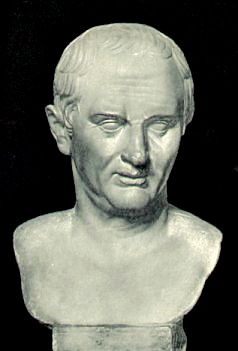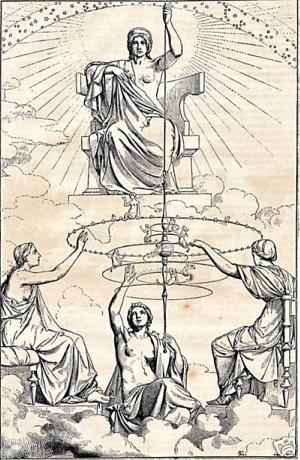Cicero eloquently summarized the philosophical position that the universe is deterministic – all events are preordained, either by nature or by divinity. Although “ignorance of causes” may create the illusion of Fortune, in reality there is only Necessity.
Cicero Citatus, Glans Inflatus?
The male academic who cites Cicero generally lacks the insight that, instead of imbuing his writing with gravitas, he inevitably conveys the impression of being a pompous dickhead (‘glans inflatus’). Particularly damaging to a writer’s reputation are Cicero quotations that occur at the start of an article; for, as Horace reminds us, “parturiunt montes, nascetur ridiculus mus”. Indeed, the only academics who seem to get away with citing Cicero are those who study Cicero’s work professionally.
 Figure 3.1: Bust of Marcus Tullius Cicero (106 BC – 43 BC), one of history’s most influential writers. Source: Wikepedia.
Figure 3.1: Bust of Marcus Tullius Cicero (106 BC – 43 BC), one of history’s most influential writers. Source: Wikepedia.
Despite the possibility of coming across as a glans inflatus, there are at least three compelling reasons why Cicero is worth reading: form, content, and impact. First and foremost, Cicero was a gifted writer with a subtle sense of humor, who liked to punctuate lively dialogue (insults included) with gripping anecdotes. Second, Cicero was not interested in trifles; his business concerns the meaning of life and the nature of the universe – parva leves capiunt animas, after all. In ‘de Natura Deorum’, for instance, Cicero has proponents of different Greek philosophical schools debate the nature of the gods: whether they exist, and, if so, what form they take, and whether or not they are willing or able to intervene in human affairs. The box below provides a fragment that highlights Cicero’s quality as a writer and the importance of the topics he deems worthy of attention.1
[box type=”shadow”]
“The Gods Pay No Heed to Man”
Dialogue from de Natura Deorum; the skeptical Cotta is speaking
“Indeed Diogenes the Cynic used to say that Harpalus, a brigand of the day who passed as fortunate, was a standing witness against the gods, because he lived and prospered as he did for so long. Dionysius, whom I mentioned before, having plundered the temple of Proserpine at Locri, was sailing back to Syracuse, and as he ran before a very favourable wind, remarked with a smile, ‘See you, my friends, what a good crossing the immortal gods bestow on men guilty of sacrilege?’ He was a clever fellow, and grasped the truth so well and clearly that he remained in the same belief continuously; for touching with his fleet on the coast of the Peloponnese and arriving at the temple of Olympian Zeus, he stripped him of his gold mantle, an adornment consisting of a great weight of metal, bestowed upon the god by the tyrant Gelo out of the spoils of the Carthaginians, and actually made a jest about it, saying that a golden mantle was oppressive in summer and cold in winter, and he threw on the god a woollen cloak, saying it was for every season of the year (…) It is also related that he produced in the market-place the spoils of the temples which I have mentioned and sold them by auction, and after he had got the money issued a proclamation that anybody who possessed any article taken from a holy place must restore that article before a fixed date to the shrine to which it belonged; thus to impiety towards the gods he added injustice towards men.
Well, Dionysius was not struck dead with a thunderbolt by Olympian Jupiter, nor did Aesculapius cause him to waste away and perish of some painful and lingering disease. He died in his bed and was laid upon a royal pyre, and the power which he had himself secured by crime he handed on as an inheritance to his son as a just and lawful sovereignty.” (Cicero, de Natura Deorum III. xxxiv–xxxv)[/box]
The third reason to read Cicero is the tremendous impact that he has had on future generations, both through his writing style and through the contents of his work, which effectively educated the Roman empire on the foundations of Greek philosophy. Cicero also facilitated the Renaissance:
“Petrarch’s rediscovery of Cicero’s letters provided the impetus for searches for ancient Greek and Latin writings scattered throughout European monasteries, and the subsequent rediscovery of classical antiquity led to the Renaissance. Subsequently, Cicero became synonymous with classical Latin to such an extent that a number of humanist scholars began to assert that no Latin word or phrase should be used unless it appeared in Cicero’s works” (Source: Wikipedia)
In later times, Cicero remained an inspiration for individual scientists including Francis Bacon (who must have been keenly aware of Cicero’s work since he appears to have plagiarized one of Cicero’s anecdotes), Gottfried Leibniz (whose book Theodicy discusses several of Cicero’s works), and Pierre-Simon Laplace (who cites Cicero at length in A Philosophical Essay on Probabilities).2
Necessity and Fortune
In Cicero’s Academica, one of the dramatis personae, Terentius Varro, summarizes the philosophy of the Socrates-Plato-Xenocrates-Aristotle school concerning the “secrets of nature”:
 Figure 3.2: “Not even the gods fight against necessity” – Simonides of Ceos (c. 556 BC – 469 BC). Source: Wikepedia.
Figure 3.2: “Not even the gods fight against necessity” – Simonides of Ceos (c. 556 BC – 469 BC). Source: Wikepedia.
“all the things that are in the world are (…) held together by a sentient being, in which perfect reason, is immanent, and which is immutable and eternal since nothing stronger exists to cause it to perish; and this force they say is the soul of the world, and is also perfect intelligence and wisdom, which they entitle God, and is sort of ‘providence’ knowing the things that fall within its province, governing especially the heavenly bodies, and then those things on earth that concern mankind; and this force they also sometimes call Necessity, because nothing can happen otherwise than has been ordained by it under a ‘fated and unchangeable concatenation of everlasting order’; although they sometimes also term it Fortune, because many of its operations are unforeseen and unexpected by us on account of their obscurity and our ignorance of causes.” (Cicero, Academica. I. vii)
Thus, Fortune is merely Necessity cloaked in ignorance. We may conclude that already for the Greek philosophers from antiquity, probability belonged wholly to the mind. As we will see in a later post, Pierre-Simon Laplace was of exactly the same opinion – apart from the petty difference that Laplace believed in the laws of nature, not in God.
In a later work, de Divinatione, Cicero brings this argument to a logical conclusion: if ignorance about hidden causes could be entirely eliminated, the future holds no secrets and can be predicted with perfect accuracy.
“Since, then, everything happens by fate (as will be shown elsewhere) if there could be any mortal who could observe with his mind the interconnection of all causes, nothing indeed would escape him. For he who knows the causes of things that are to be necessarily knows all the things that are going to be. But since no one but God could do this, what is left for man is that he should be aware of future things in advance by certain signs which make clear what will follow. For the things which are going to be do not come into existence suddenly, but the passage of time is like the unwinding of a rope, producing nothing new but unfolding what was there at first.” (Cicero, de Divinatione)
The fact that Fortune differs from Necessity only by ignorance –a property of the observer, not of what is observed– is deeply counterintuitive. It is so counterintuitive, in fact, that it may have confused even Albert Einstein; but this is the topic of the next post.
Like this post?
Subscribe to the JASP newsletter to receive regular updates about JASP including the latest Bayesian Spectacles blog posts! You can unsubscribe at any time.
Footnotes
1 It is remarkable that many modern arguments against the existence of divinity –arguments promulgated by popular atheist authors such as Richard Dawkins, Sam Harris, and Christopher Hitchens– are already presented in de Natura Deorum. An obvious exception is the argument that people’s “marvellous adaptation” to their environment (discussed by Cicero at length) can be explained by evolution, a concept that would lay dormant for another two millennia.
2 The current-day opinion on Cicero is sharply divided. Wikepedia notes: “His commitment to the values of the Republic accommodated a hatred of the poor and persistent opposition to the advocates and mechanisms of popular representation. Friedrich Engels referred to him as “the most contemptible scoundrel in history” for upholding republican “democracy” while at the same time denouncing land and class reforms. Cicero has faced criticism for exaggerating the democratic qualities of republican Rome, and for defending the Roman oligarchy against the popular reforms of Caesar.”
Want to know more?
Cicero, M. T. (45 BC). Academica. Translation by H. Rackham, 1956
Cicero, M. T. (45 BC). de Natura Deorum. Translation by H. Rackham, 1956
Cicero, M. T. (44 BC). de Devinatione.
Shew, M. M. (2008). The Phenomenon of Chance in Ancient Greek Thought. Doctoral dissertation, University of Oregon.
About The Author

Eric-Jan Wagenmakers
Eric-Jan (EJ) Wagenmakers is professor at the Psychological Methods Group at the University of Amsterdam.



